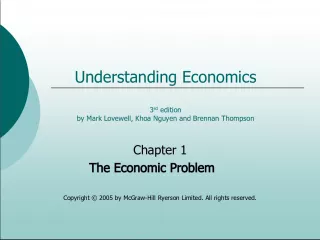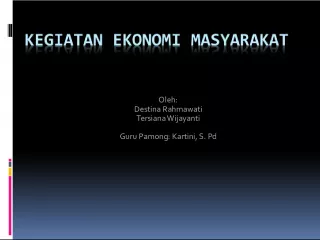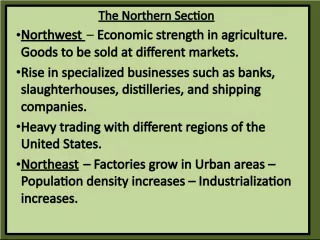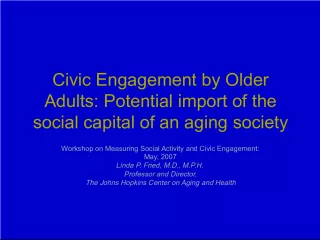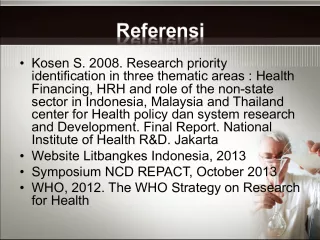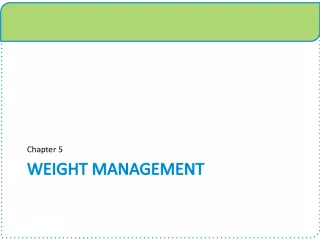Understanding Economic Health and Productivity
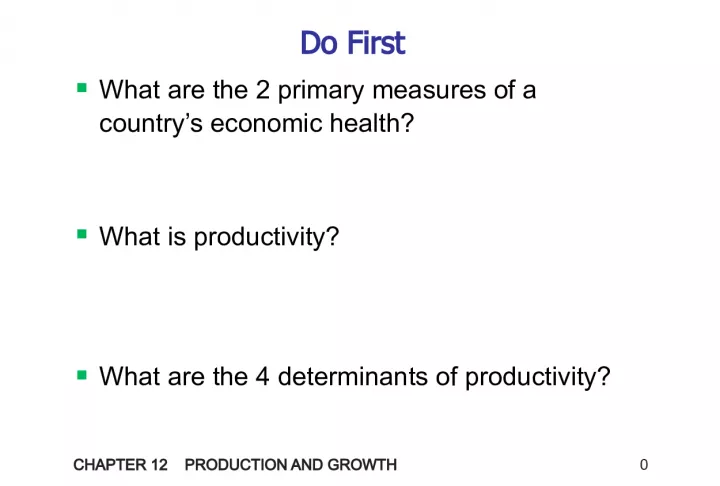

This article covers the two primary measures of a country's economic health, namely Gross Domestic Product (GDP) and Gross National Income (GNI). Additionally, it explains the concept of productivity and
- Uploaded on | 0 Views
-
 danielwilliams
danielwilliams
About Understanding Economic Health and Productivity
PowerPoint presentation about 'Understanding Economic Health and Productivity'. This presentation describes the topic on This article covers the two primary measures of a country's economic health, namely Gross Domestic Product (GDP) and Gross National Income (GNI). Additionally, it explains the concept of productivity and. The key topics included in this slideshow are . Download this presentation absolutely free.
Presentation Transcript
Slide10Do First What are the 2 primary measures of a country’s economic health? What is productivity? What are the 4 determinants of productivity? CHAPTER 12 PRODUCTION AND GROWTH
Slide2A C T I V E L E A R N I N G 1 : Discussion question A C T I V E L E A R N I N G 1 : Discussion question Which of the following policies do you think would be most effective at boosting growth and living standards in a poor country over the long run? 1 a. offer tax incentives for investment by local firms b. …by foreign firms c. give cash payments for good school attendance d. crack down on govt corruption e. restrict imports to protect domestic industries f. allow free trade g. give away condoms
Slide32CHAPTER 12 PRODUCTION AND GROWTH ECONOMIC GROWTH AND PUBLIC POLICY Next, we look at the ways public policy can affect long-run growth in productivity and living standards. Next, we look at the ways public policy can affect long-run growth in productivity and living standards. Next, we look at the ways public policy can affect long-run growth in productivity and living standards. Next, we look at the ways public policy can affect long-run growth in productivity and living standards.
Slide43CHAPTER 12 PRODUCTION AND GROWTH Saving and Investment A country may be more productive because they have more capital • More capital requires investment To get more capital means a country would have to reduce consumption • Why? • Reducing consumption = increasing saving. This extra saving funds the production of investment goods.
Slide54Saving & Investment A country must save (not consume) in order to purchase capital • More capital makes a country more productive Now, there’s a tradeoff! • Consume now, or consume later • This is one of the 10 principles! CHAPTER 12 PRODUCTION AND GROWTH
Slide65Review What would make a country more productive? What must they do to get this? CHAPTER 12 PRODUCTION AND GROWTH
Slide76CHAPTER 12 PRODUCTION AND GROWTH Diminishing Returns and the Catch-Up Effect The govt can implement policies that raise saving and investment • When the country uses the investment to buy more capital (k), productivity & standard of living rise But this faster growth is temporary, due to diminishing returns to capital : • As K rises, the extra output from an additional unit of K falls….
Slide87CHAPTER 12 PRODUCTION AND GROWTH Output per worker (productivity) The Production Function & Diminishing Returns K / L Productivity Capital per worker If workers have little K , giving them more increases their productivity a lot. If workers already have a lot of K , giving them more increases productivity fairly little.
Slide98CHAPTER 12 PRODUCTION AND GROWTH the property whereby poor countries tend to grow more rapidly than rich ones The catch-up effect: K / L Y / L Poor country starts here Rich country starts here Poor country’s growth Rich country’s growth
Slide109CHAPTER 12 PRODUCTION AND GROWTH Example of the Catch-Up Effect Over 1960-1990, the U.S. and S. Korea devoted a similar share of GDP to investment, so you might expect they would have similar growth performance. But growth was >6% in Korea and only 2% in the U.S. Explanation: the catch-up effect. In 1960, K / L was far smaller in Korea than in the U.S., hence Korea grew faster.
Slide1110CHAPTER 12 PRODUCTION AND GROWTH Investment from Abroad To raise K / L and hence productivity, wages, and living standards, the govt can also encourage • Foreign direct investment : a capital investment ( e.g ., factory) that is owned & operated by a foreign company. • Foreign portfolio investment : a capital investment financed with foreign money but operated by locals. Some of the returns from these investments flow back to the foreign countries that supplied the funds.
Slide1211CHAPTER 12 PRODUCTION AND GROWTH Investment from Abroad Especially beneficial in poor countries that cannot generate enough saving to fund investment projects themselves. Also helps poor countries learn state-of-the-art technologies developed in other countries. This benefits everyone! • Less economic trouble = less political trouble
Slide1312CHAPTER 12 PRODUCTION AND GROWTH Education Govt can increase productivity by promoting education–investment in human capital ( H ). • public schools, subsidized loans for college Education has significant effects: In the U.S., each year of schooling raises a worker’s wage by 10%. But investing in H also involves a tradeoff between the present & future: Spending a year in school requires sacrificing a year’s wages now to have higher wages later.
Slide1413CHAPTER 12 PRODUCTION AND GROWTH Health and Nutrition Health care expenditure is a type of investment in human capital – healthier workers are more productive. In countries with significant malnourishment, raising workers’ caloric intake raises productivity: • Over 1962-95, caloric consumption rose 44% in S. Korea, and economic growth was spectacular. • Nobel winner Robert Fogel: 30% of Great Britain’s growth from 1790-1980 was due to improved nutrition.
Slide1514Promote Property Rights and Political Stability In Countries with high corruption & crime rates, there is little motivation to invest in capital So, countries who respect property rights & maintain political stability tend to have higher GDPs Countries can fix this by adjusting policy to encourage more law enforcement, work with people to reduce risk of revolution, etc. CHAPTER 12 PRODUCTION AND GROWTH
Slide1615CHAPTER 12 PRODUCTION AND GROWTH Free Trade Inward-oriented policies ( e.g ., tariffs, limits on investment from abroad) aim to raise living standards by avoiding interaction with other countries. Outward-oriented policies ( e.g ., the elimination of restrictions on trade or foreign investment) promote integration with the world economy.
Slide1716CHAPTER 12 PRODUCTION AND GROWTH Free Trade Recall: Trade can make everyone better off. Trade has similar effects as discovering new technologies – it improves productivity and living standards. Countries with inward-oriented policies have generally failed to create growth. • e.g., Argentina during the 20 th century. Countries with outward-oriented policies have often succeeded. • e.g., South Korea, Singapore, Taiwan after 1960.
Slide1817CHAPTER 12 PRODUCTION AND GROWTH Research and Development Technological progress is the main reason why living standards rise over the long run. One reason is that knowledge is a public good : Ideas can be shared freely, increasing the productivity of many. Policies to promote tech. progress: • patent laws • tax incentives or direct support for private sector R&D • grants for basic research at universities
Slide1918CHAPTER 12 PRODUCTION AND GROWTH Population Growth …may affect living standards in 3 different ways: 1. Stretching natural resources 200 years ago, Malthus argued that pop. growth would strain society’s ability to provide for itself. Since then, the world population has increased sixfold. If Malthus was right, living standards would have fallen. Instead, they’ve risen. Malthus failed to account for technological progress and productivity growth.
Slide2019CHAPTER 12 PRODUCTION AND GROWTH Population Growth 2. Diluting the capital stock more population = higher L = lower K / L = lower productivity & living standards. This applies to H as well as K : fast pop. growth = more children = greater strain on educational system. Countries with fast pop. growth tend to have lower educational attainment.
Slide2120CHAPTER 12 PRODUCTION AND GROWTH Population Growth To combat this, many developing countries use policy to control population growth. • China’s one child per family laws • contraception education & availability • promote female literacy to raise opportunity cost of having babies 2. Diluting the capital stock
Slide2221CHAPTER 12 PRODUCTION AND GROWTH Population Growth 3. Promoting tech. progress More people = more scientists, inventors, engineers = more frequent discoveries = faster tech. progress & economic growth Evidence from Michael Kremer: Over the course of human history, • growth rates increased as the world’s population increased • more populated regions grew faster than less populated ones
Slide23A C T I V E L E A R N I N G 2 : Productivity A C T I V E L E A R N I N G 2 : Productivity List the determinants of productivity. List three policies that attempt to raise living standards by increasing one of the determinants of productivity. 22
Slide2423Independent Practice! Writing activity: Pick 1 policy that you think would be most effective in increasing the standard of living in a country (pick a country), and write 1 paragraph explaining the policy and how it would improve things for the people of that country. Be sure to include which determinant of productivity will be affected. CHAPTER 12 PRODUCTION AND GROWTH
